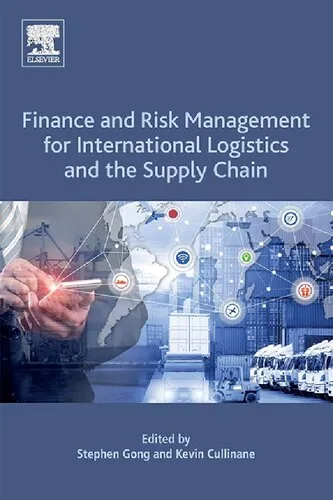Finance and Risk Management for International Logistics and the Supply Chain
4.5
Reviews from our users

You Can Ask your questions from this book's AI after Login
Each download or ask from book AI costs 2 points. To earn more free points, please visit the Points Guide Page and complete some valuable actions.Introduction to Finance and Risk Management for International Logistics and the Supply Chain
In today's globalized world, the interconnectivity of markets, industries, and consumers has placed logistics and supply chain management at the heart of business success. However, with this global network comes a plethora of financial and risk management challenges that require innovative strategies and comprehensive knowledge. Finance and Risk Management for International Logistics and the Supply Chain serves as a definitive guide for professionals, academics, and students striving to master the financial intricacies and risk considerations that underpin modern supply chain operations.
Detailed Summary of the Book
At its core, the book unpacks the indispensable linkages between finance, risk management, and logistics in the context of today's supply chain systems. This book is structured to provide both theoretical insights and practical applications, enabling readers to understand and tackle the multi-faceted challenges inherent in international trade and supply chain operations. The book begins by laying a solid foundation in the principles of logistics and supply chain management, emphasizing the global perspective that businesses must adopt to remain competitive.
The narrative delves into the financial aspects of the supply chain, exploring concepts such as working capital management, cost optimization, and cash flow intricacies that drive effective decision-making. Each concept is intertwined with real-world examples and case studies, allowing readers to appreciate the challenges and opportunities at hand.
One of the defining aspects of the book is its focus on risk identification, assessment, and mitigation strategies. From geopolitical risks and currency fluctuations to disruptions caused by natural disasters and pandemics, no stone is left unturned in addressing risk factors that modern organizations face in global logistics and supply chain management. Notably, the book proposes strategies to enhance supply chain resilience amidst economic, environmental, and technological uncertainties.
The book stresses the importance of collaboration, digital transformation, and sustainable practices in achieving long-term success. By weaving together principles of finance, risk management, and supply chain operations, it provides a comprehensive, holistic approach that readers can directly implement in their respective fields of work.
Key Takeaways
- A detailed understanding of financial principles in logistics and supply chain management, including cost control and profitability analysis.
- Insight into identifying and mitigating risks, such as supply disruptions, currency volatility, and supplier insolvencies.
- Frameworks for creating resilient and sustainable supply chain systems that adapt to market and environmental changes.
- Application of case studies to connect theoretical knowledge with real-world decision-making and problem-solving.
- A forward-looking perspective on how technology and digital transformation influence finance and risk management in the supply chain.
Famous Quotes from the Book
"In the nexus of global trade, logistics and finance form the arteries that ensure the steady flow of goods, capital, and opportunity."
"Risk in the supply chain is not an obstacle—it’s an active variable that demands exceptional management, continuous adaptation, and forward-thinking solutions."
Why This Book Matters
Global supply chains face unprecedented challenges as businesses contend with a rapidly evolving trade landscape. Finance and Risk Management for International Logistics and the Supply Chain is a critical resource for anyone looking to deepen their expertise and navigate this complexity with confidence. From professionals working in multinational corporations to entrepreneurs managing small-scale operations, the insights in this book are vital for competitive resilience, operational efficiency, and sustainable growth.
This book is particularly valuable in its ability to bridge the gap between theoretical learning and practical implementation. Its clear writing style, actionable advice, and real-world examples make it accessible to readers of varying expertise levels. Furthermore, its emphasis on long-term strategies, such as preparing for supply chain disruptions, implementing sustainable practices, and embracing technology, provides readers with tools to thrive in dynamic global markets.
As a result, this book is not just a guide but a roadmap for navigating the intricate world of international logistics while balancing financial performance and minimizing risks. It empowers readers to make informed decisions, adopt innovative frameworks, and ensure their supply chain operations contribute to overall business success. Its relevancy and applicability across various industries make it a cornerstone for anyone interested in international trade, finance, and logistics.
Free Direct Download
Get Free Access to Download this and other Thousands of Books (Join Now)
For read this book you need PDF Reader Software like Foxit Reader
Accessing books through legal platforms and public libraries not only supports the rights of authors and publishers but also contributes to the sustainability of reading culture. Before downloading, please take a moment to consider these options.
Find this book on other platforms:
WorldCat helps you find books in libraries worldwide.
See ratings, reviews, and discussions on Goodreads.
Find and buy rare or used books on AbeBooks.


